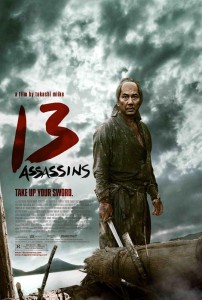
13 ASSASSINS
Japan, 2010, 138 minutes. Colour.
Koji Yakusho, Goro Inagaki.
Directed by Takashi Miike.
The title tells all in terms of plot and content. At the end of the Shogunate in mid-19th century Japan, the Shogun has promoted an upstart who is both shallow and callow, with little regard for people, who lives for excitement and power. Authorities dread his coming into power at the death of the Shogun and they call on a veteran Samurai to eliminate the despot.
After establishing the situation, the film focuses on Shinza, the Samurai leader, his negotiations with the followers of the upstart and their failure, then moves to his quest to find other Samurai who will train, perfect their martial skills and go on a quest which may well lead to their deaths as well. The film then moves on to the journey-quest, the hardships, especially in the mountains, and the bouts of opposition the warriors meet. They rescue a peasant hunter in the mountains. He joins them though he is offhandedly critical of their code.
The audience is in sympathy with the Samurai because several sequences of the upstart’s callous behaviour, rape and murder without a second thought or a moment’s compunction, have been seen.
However, the latter part of the film devotes over 30 minutes to the final confrontation. The Samurai ingeniously fortify an abandoned village, filling it with traps for the enemy and escape routes for themselves. The up close and personal detail of the fighting is effective except that it goes on for so long (and we really have not learned much about each of the assassins or identified all of them) that the attention begins to wander. Too much of a bloodthirsty thing.
The film is expertly made with great attention to period detail. What it lacks in character delineation, it makes up for in taking the audience back into this period of Japanese history and a different culture which brought about the end of the Shogunate and opened up Japan to its modern era.
1. The status of the film? Its awards? The tradition of the samurai films? Of Akira Kurosawa? Of The Seven Samurai?
2. A 21st century version of a samurai film? Memories of the Japanese history of such films? The return to the 19th century? Feudal Japan? The era of the Shogun? The end of that era? The beginnings of the modern era?
3. The film as a spectacle, the re-creation of period, the villages, the castles, the use of the countryside? Rugged and beautiful? The musical score?
4. The costumes and their authenticity? The feel of the period? Its appearance?
5. The special effects, the stunt work, the battles, the village and its traps?
6. The focus on the battles, the lengthy massacre, the motivations for the fighting? The choreography?
7. The focus on the assassins, the initial hara-kiri? The shogun, the favouritism towards the young Lord Naritsugu? His despotism? His plans for the future? Going against the samurai codes? The visualising of his cruelty, the rape of the bride, the murder of her husband? His repeating this behaviour? His callous attitudes towards life, towards people? Strong enough motivation for the assassins?
8. The visit to Shinza, fishing, the messenger? His return to his house? The explanation of the situation? The interview with Hanbei, Shinza’s rejection of his stance? Hanbei and his looking to the future, loyalty to Naritsugu?
9. The personality of Shinza, his experience? His gravitas?
10. The process of his seeking out the potential assassins? The meetings, their personalities, seeing them in action, their motivations? The formation of the group? The fact that the individuals did not stand out as strong characters for the audience? The focus on the group?
11. Sir Doi? His status in the kingdoms, his advice to Shinza, his attitude towards the shogun, towards Naritsugu?
12. The group and their skills, their practice? The young and the old? Prepared for their trek?
13. The visualising of the trek, the opposition from Naritsugu’s men? The fights? The shortcut through the mountains? The mountain road? The encounter with the hunter in the net, cutting him down? His attitudes towards the samurai? Disrespectful? His yearning for the young woman? His fighting with bears and other animals? His joining the group?
14. The build-up towards the encounter with Naritsugu and his men? The bigger number than expected? The assassins in the village, the negotiations with the head man? His stopping Naritsugu, his defiance, the memories of his daughter and her death? The symbolism of his hara-kiri?
15. The requisitioning of the village, the building of all the traps? The ingenious nature of all the traps and escapes? Seeing them in action with the warriors?
16. The attention given to the battle, the notice for the massacre? Shinza and his leadership? The thirty to forty minutes of the battle sequence? The stunt work, the attention to detail, the editing? Audiences experiencing being there? The role of the assassins, their skills? Naritsugu and his men?
17. Naritsugu, his experience of being confronted, finding it stimulating? His presence at the end, the confrontation with Shinza? Attempting to kill him? His own death – and his still-cynical attitudes, the confrontation, the glory and excitement of war, wanting this to be part of his future rule, his death and his cowardliness, wanting to avoid the pain? The decapitation?
18. The individuals and their fights, being trapped, the warriors and defeating them? The hunter, his stones, his being wounded, defying the wounds? His continuing his attitude towards the samurai?
19. The achievement, the suicide mission? The warriors and their deaths? The samurai and their deaths?
20. The director’s comment, his perspective on this warrior lifestyle, the difficulties in the kingdom, the need for a transition, the violence of the fighting? For a 21st century audience? Japanese? International?